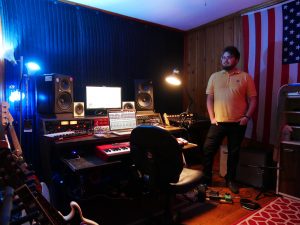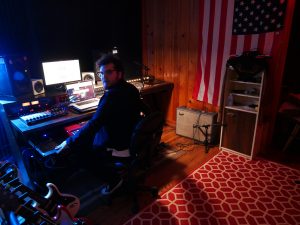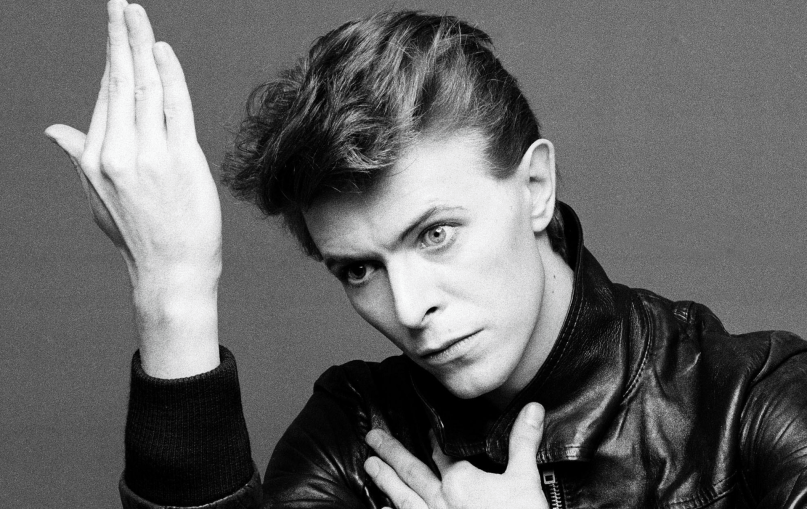By Keith Walsh
The passing of David Bowie in 2016 was hard for us fans to bear, even with the fabulous farewell messages in “Blackstar.” New iterations of his music are a welcome way to grieve and celebrate his legacy. Particularly when they’re done so beautifully as the tunes coming out of Nate Bridge’s studio in Nashville, under the name Black Market: Dub Bowie.
If you’re a Bowie fan, you’ve got to hear these. Bridges brings tons of musical skill and artistry to his reggae dub remixes of classic Bowie tunes – from “Ziggy Stardust” to “Across The Universe” (being a Bowie cover of a classic Beatle’s song.) I was fortunate to have the chance to send him a few questions about the craft and philosophy involved in creating these brilliant new compositions, which use isolated vocal tracks and feature Bridge’s musical expertise.
So is doing dub as much of a technical practice as it is an artistic one?
Nate Bridges: “It’s a balance of the two, it’s very yin and yang. If you don’t have your session setup in a way that facilitates maximum creativity, then you won’t wind up with very interesting music. On the other hand, if you rely too much on technology the music won’t have the human touch that is inherent to dub music. I find that doing a dub pass of a mix frees up a song and makes it feel much more vibrant and dynamic. There is an undeniable human touch behind the controls of a dub mix that you can hear and feel. King Tubby is a masterful technician and sound engineer, but when he is performing a dub mix it is pure art. He is the true embodiment of the dichotomy that makes dub such an amazing and unique genre.”
How much of the process is intuitive, and how much relies on music theory?
Nate Bridges: “Reggae music very rarely goes outside the bounds of simple major and minor chords, and it is that simplicity that makes reggae such a fun genre to listen to. It’s kind of like the blues in that way. But growing up I would hear songs by rock artists like The Beatles or The Rolling Stones and I would say to myself ‘these chord progressions are slightly more complicated, but does that make them too complicated for reggae?'”
“Once I created Black Market I think I proved to myself that the answer to that question is a definitive no. I truly believe any song can be remade in any style of music, and doing so can reveal a lot about the original composition as well as the genre it’s being transposed into. I remember some in the reggae community saying I shouldn’t use major or minor seventh chords in reggae, that I should only use simple triad chords. But to follow that weird unwritten rule would be to deny the original song of the qualities that make it good in the first place, and also, to deny certain chords from an entire genre is basically stunting its growth. Music theory, much like music gear, is just a tool in the tool box. If it breaks when you bend it, maybe you don’t need it at all.”

What’s your musical training and background?
Nate Bridges: “I grew up with private guitar and piano lessons, I was in many bands, and in high school spent all of my time after school at a local recording studio called Rockwell Sounds where I interned and helped start an ongoing dub installation called Dub Robot with my mentor Brian Wallace. Brian taught me just about everything I know about reggae music. When I was 18 I was accepted into the Berklee College of Music in Boston where I graduated with a degree in Music Production & Engineering, and after that I moved to Valencia, Spain where I enrolled in a one year accelerated Master’s program through Berklee in Music Technology & Innovation.”
“When I finished school I moved to Los Angeles and became a runner at Capitol Studios, which was the craziest few years of my life. I sat in on sessions with Neil Young, Bob Dylan, Adele, John Mayer, just about everyone you can imagine. After I got burned out being a runner, I moved to Nashville where I’ve lived for a little over a year. The cost of living here allows me to run a small home studio where I produce all of my Black Market music as well as mix and master for other clients as well.”
What kind of processing is involved in creating these tracks?
Nate Bridges: “My current setup is a Focusrite 8preX into Ableton. I use a Benidub Spring reverb amp for my reverb and typically a combination of multiple delays including El Capistan, Soundtoy’s Echoboy, and Ableton’s tape delay. I have a Tascam 388 1/4” tape machine and mixer that I use as a summing mixer and for tape saturation out of Ableton before my mixes go through my mastering process. My mastering chain is primarily Ozone 7, additional saturation, an L2 Limiter, and iZotope Insight for metering.”

Who did the bass and the synths and beats?
Nate Bridges: “I play all the instruments on my tracks unless otherwise specified. The drums are mainly loops I acquired from Drumdrops.com. I also use drummer from Los Angeles named John Kyle who I recorded myself at The Majestic Recording Studio. I typically just will take a loop of a drum beat and cut it up to fit a certain arrangement. After that I begin layering in all of the other instrumentation one by one.”
Bridge’s Guitar Gear
Nate Bridges: “I have a vintage Supro amp from the 60s that I use now, I also have a Fender Twin Reverb but that is stuck in California at the moment. For guitars, I mainly play a 1972 Telecaster that I had to have restored and refinished. It’s got a Lollar P90 in the neck and the original stock bridge pickup. I also play a 90s Fender Jagstang guitar (the one Kurt Cobain designed), and it’s actually a remarkably great guitar for reggae due to the high action. My bass is a standard Fender Jazz bass, made in Mexico. I run it through an Ampeg bass preamp/foot pedal, direct in to a compressor. From there I typically duplicate the track and add a Lo Air plugin for sub frequencies. I bought my bass years ago and never played it, but now I play it constantly for Black Market. I don’t think I’ve ever changed the strings, and I don’t know if that’s a good thing or a bad thing.”
Nate Bridges operates a studio in Nashville, TN. More info can be found at https://blackmarketdub.bandcamp.com/
www.bridgesmixingandmastering.com
https://www.patreon.com/blackmarketdub
https://www.facebook.com/blackmarketdub
finis
